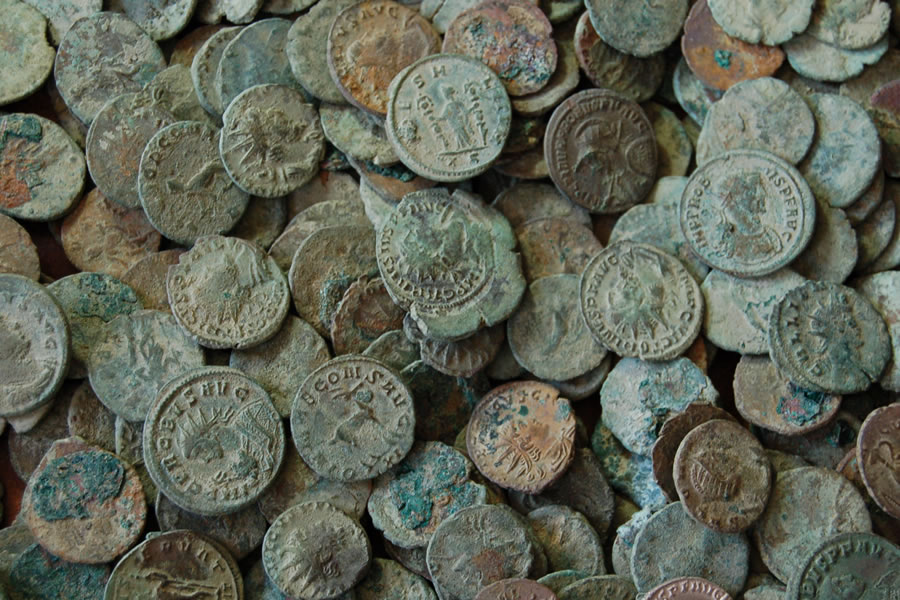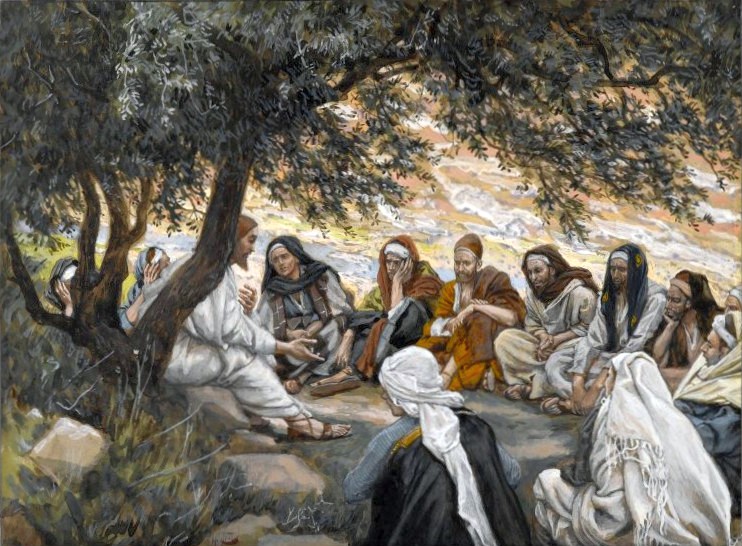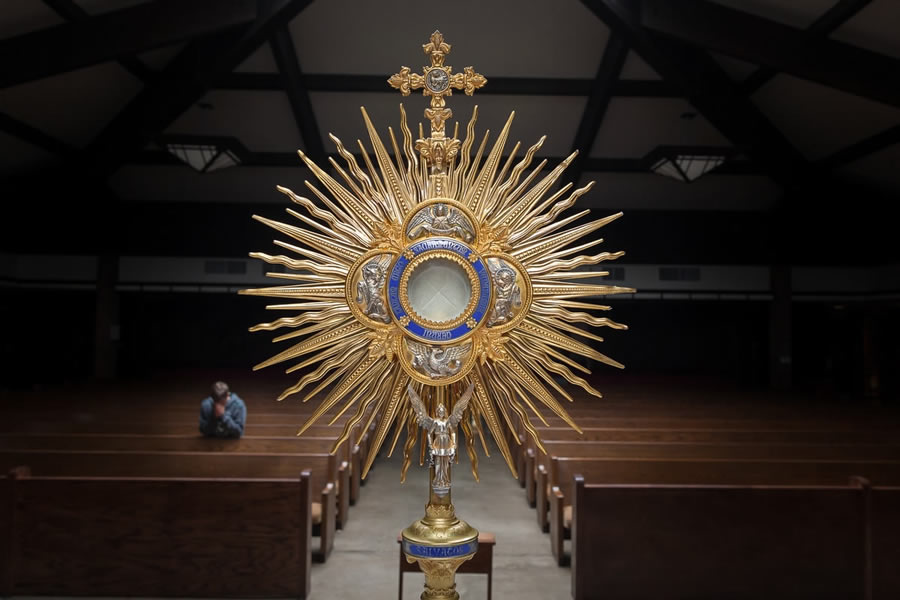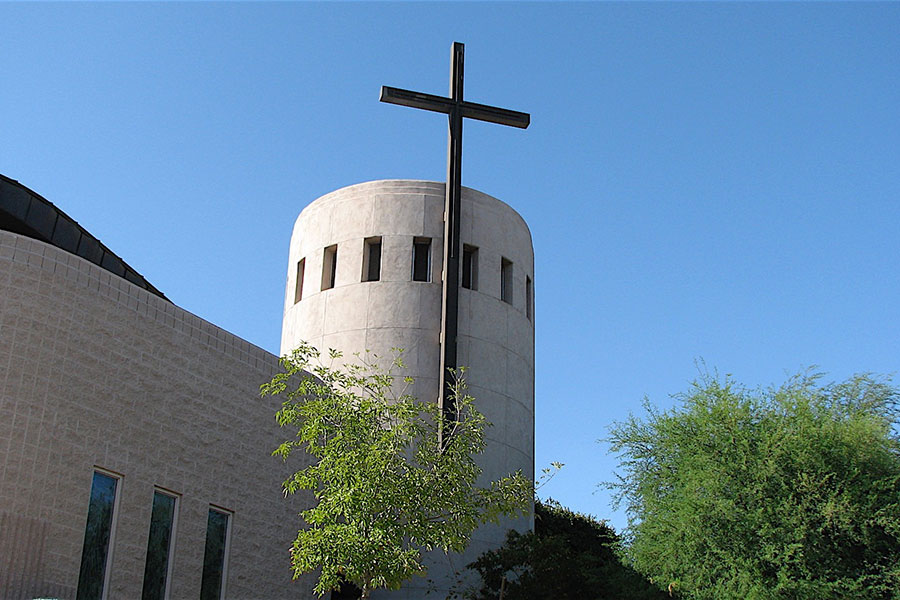Corpus Christi Blog

Christian Stewardship - Treasure
09-29-2019Weekly ReflectionJennifer ArnoldGreetings! This week we will discuss the final pillar of Christian Stewardship which is Treasure. Discussion about how we are good stewards of our treasure always seems to be a little more sensitive than the other two pillars of Christian Stewardship. It is quite common to convince ourselves that if we had more, then we’d give more rather than vice versa. Why do we all hate to talk about money? Jesus Himself did not find it at all awkward to talk to us about how to approach our money and material belongings. Take a look at these Gospels that are jam-packed with stories about money and belongings: The Rich Young Man (Mt 19:16-24), The Workers in the Vineyard (Mt 20:1-16), Paying Taxes to the Emperor (Mt 22:15-22), The Parable of the Talents (Mt 25:14-30), The Poor Widow’s Contribution (Mk 12:41-44), The Good Samaritan (Lk 10:29-37), The Parable of the Rich Fool (Lk 12:16-21) and The Parable of the Lost Coin (Lk 15:8-10).
Typically, when we are talking about being good stewards of our treasure, we are talking about almsgiving, or tithing. Tithing is a way to give money to our parish, diocese, or other specific organizations in order to direct our collective money in a streamlined fashion to build up our parish, Church, and the members of our community who are in need. The Catechism of the Catholic Church addresses economic activity and how it relates to the Body of Christ. “Everyone has the right of economic initiative; everyone should make legitimate use of his talents to contribute to the abundance that will benefit all and to harvest the just fruits of his labor. He should seek to observe regulations issued by legitimate authority for the sake of the common good” (CCC #2429). In other words, we each have a right to earn money and material goods through the gifts of our talents and we have a right to reap the fruits of our work, but with those rights comes the obligation to use those material gains for the common good of the entire Body.
READ MORE
Christian Stewardship - Talent
09-22-2019Weekly ReflectionJennifer ArnoldLast week we discussed what it means to be good stewards of our time. This week, we’ll take a closer look at what it means to be good stewards of our talent.
First, we must understand what is meant when we refer to our talents. God has bestowed on each of us particular gifts, graces, and charisms which are specific and unique to each of us individually. Reflecting on the image of the Body of Christ, it is easy to understand why He distributed these gifts so diversely. A body cannot be made up entirely of eyes, for example, or it would not also be able to run or listen. A body must have all of its many parts which each have the properties fitting to that part to make the entire body work properly. So too, we, the members of the Body of Christ, must have gifts proper to each of us so His Body can function as it should, according to His will.
READ MORE
Christian Stewardship - Time
09-15-2019Weekly ReflectionJen ArnoldGreetings! As a new member of the Pastoral Council, Father Chad asked me to lend him a helping hand by writing a series of articles on Christian Stewardship.
Over the last several weeks (and years!), Father Chad has been working hard to help form us into intentional disciples. Both in his homilies and in his bulletin articles, he has explained our parish mission statement and what it means to be a disciple of Christ. Included within the many characteristics of being a disciple that Father has already laid out for us is the quality of Christian Stewardship which is composed of the three pillars of Time, Talent, and Treasure. When we, as disciples, are being good stewards of these three things, we give God our first fruits to build up His Kingdom and the Body of Christ through which He then blesses us abundantly in return. Today, we will take a closer look at how we are to be good stewards of our time to serve God and in the coming weeks we’ll examine the other two.
READ MORESt. Josemaria Escriva's 17 characteristics of a person who lacks humility
09-08-2019What's Your Story?- Thinking that what you do or say is better than what others do or say;
- Always wanting to get your own way;
- Arguing when you are not right or — when you are — insisting stubbornly or with bad manners;
- Giving your opinion without being asked for it, when charity does not demand you to do so;
- Despising the point of view of others;
- Not being aware that all the gifts and qualities you have are on loan;
- Not acknowledging that you are unworthy of all honour or esteem, even the ground you are treading on or the things you own;
- Mentioning yourself as an example in conversation;
- Speaking badly about yourself, so that they may form a good opinion of you, or contradict you;
- Making excuses when rebuked;
- Hiding some humiliating faults from your director, so that he may not lose the good opinion he has of you;
- Hearing praise with satisfaction, or being glad that others have spoken well of you;
- Being hurt that others are held in greater esteem than you;
- Refusing to carry out menial tasks;
- Seeking or wanting to be singled out;
- Letting drop words of self-praise in conversation, or words that might show your honesty, your wit or skill, your professional prestige…;
- Being ashamed of not having certain possessions…
Read the original article here.

Discipleship (part 2)
09-08-2019Weekly ReflectionFr. Chad KingLast week, we learned from the original disciples that discipleship is a journey; it is an intentional process of becoming fully alive and happy even while on this earth, excitedly anticipating life everlasting in Heaven. That is the reason for the “Becoming Disciples” in our vision statement. Those part of the parish about four years ago may recall that I asked parishioners to read and join our discussion on the book Forming Intentional Disciples. I had first read it about eight years ago (one year into my priesthood). It described what I had observed in the Church in every parish where I had been in but had been unable to articulate. I reflected on how my relationship with Jesus had indeed influenced, directed, and become central in my life. I recognized that it was my relationship and love for Jesus that made the sacraments alive and placed choosing and living my faith as priority #1. However, as I read the five thresholds of a journey to discipleship described in the book, I remembered ways I had grown to become a disciple. The five thresholds include:
READ MOREDiscipleship is becoming ready for Heaven
09-08-2019HomiliesFr. Chad KingRaise your hand if you want to go to Heaven? Good everyone’s hand is raised.
Raise your hand if you want to become a Disciple of Jesus? I should see everyone’s hand- Because as we will see becoming a disciple is what it takes to enter Heaven.
Raise your hand if you think you are a Disciple of Jesus? 5%- bulletin, Becoming Disciples is part of our Vision statement as a parish. - demanding cost of discipleship.
Gospel- Confusing and hard statement- unless we hate our family member’s we cannot be Jesus’ disciple? How can God who is love, who called us to love our enemies, and honor our father and mother- call us to hate the very same people we are called to love and honor?
What does Jesus mean? Perhaps Matthew’s version of this passage will clarify. “Whoever loves father or mother, or son or daughter more than me is not worthy of me”
So how might you sometimes love your family more than God? Say you go on vacation or to your sons or daughter’s sporting event or something- if you don’t try to find a Mass where you are then you are loving your family more than God.
READ MORE
Discipleship (Part 1)
09-01-2019Weekly ReflectionFr. Chad KingNow that we have looked a little bit at what being the Body of Christ means – both as members of the larger universal Church and also as members of Corpus Christi – let us turn our attention to the next part of our vision statement and what it means to Become Disciples.
If we were to ask the average Catholic what the Catholic Church is about, I imagine most of the answers would focus on the sacraments and helping people get to Heaven. However, while the sacraments are the means by which the Church fulfills its mission and purpose, the actual mission of the Church is the last command Jesus gave to the 11 remaining disciples: “Go, make disciples of all nations, baptizing them in the name of the Father, and of the Son, and of the Holy Spirit, teaching them to observe all that I have commanded you” (Mt. 28:19). Thus, for us and indeed for every Catholic Church, our mission, our purpose, what we must be about, is to first become disciples and to make disciples.
READ MORE
Our Vision Statement: The Body of Christ – Becoming Disciples Part 2
08-25-2019Weekly ReflectionFr. Chad KingI continue my reflection on our Vision Statement: The Body of Christ — Becoming Disciples. Last week, I talked about the many ways we are striving to become a closer “family of families” of Corpus Christi through the various casual, fun activities we have throughout the year and I even forgot to mention our annual Parish Picnic, which is our primary, fun, community-building activity! Today, though, I want to focus on the unifying agent of our Corpus Christi family and how we become the Body of Christ we are meant to be.
To be a welcoming community is one of the challenges in all parishes the size of Corpus Christi, and thankfully we need to grow in our hospitality because we continue to attract many new parishioners each month! As I said, it takes the whole family; it takes all of us to be welcoming and intentionally having a family-like mentality to see each other as brothers and sisters. It starts with every one of us doing our part to be friendly, hospitable, and welcoming. Perhaps a closer look at what it means to be part of “the Body” will be helpful. We, the Church, are the Body, and Christ is the Head (Col 1:18). He directs us, just as every movement of our arm, leg, or any part of our bodies, every decision we make, indeed, everything we do, first comes from our head. Our brain tells our muscles and every part of our bodies what to do. So, let us ask ourselves, does Christ our Head tell us what to do? Likewise, as we learn from 1 Cor 12, we are all members of the Body, we all have a function in the Body, and we all have to do our part. Anyone who has had surgery on a body part — say a leg, arm, or back — knows how hard it is for the other body parts to compensate. That being said, the body also has to work together to accomplish most tasks. It is not someone else’s job to be friendly, welcoming, and helping to serve others — it is all of ours, as that is what Christ our head calls us to do.
READ MOREStewardship is part of Discipleship
08-18-2019HomiliesFr. Chad KingI began my homily last week stating our new Vision statement that the Pastoral Council and Parish Staff developed a couple of weeks ago. Our new Vision statement is: The Body of Christ Becoming Disciples. Upcoming bulletins will share more details about our Vision statement, so please stay tuned. In my homily last week, I said that stewardship, and being a good steward, is an aspect of Discipleship. Our Gospel last week, the Parable of the Rich Fool, revealed what stewardship is. Stewardship is not solely about money, as some people might think, but rather stewardship is the attitude we have about all the things that we have, including money; it is about seeing everything we have as gifts from God to be used well for His purposes and the good of His people. And so, to paraphrase the last line of last week’s Gospel, stewardship is about becoming rich in what matters to God. So, if you attended this mass last week, or a mass that I did not celebrate, I encourage you to read my homily from last week on our website.
READ MORE20th Sunday in Ordinary Time Year C
08-18-2019HomiliesDeacon Chris KelloggAs we reflect on the readings today there is one question we should ask ourselves, will I commit myself wholeheartedly to following Jesus? Before we explore this further I will share these words spoken by Franklin D. Roosevelt to our nation in 1936 which I think apply to us today. He said, “No greater thing could come to our land today than a revival of the spirit of religion—a revival that would sweep through the homes of the nation and stir the hearts of men and women of all faiths to a reassertion of their belief in God and their dedication to His will for themselves and for their world.” He would say, “I doubt if there is any problem whether it be social, political or economic that would not melt away before the fire of such a spiritual awakening.”
Our readings today allude to a great cosmic battle that is taking place all around us. They invite us to consider the struggle and difficulty inherent in being a Christian. The path of following Christ is frequently one of opposition, one of difficulty in every time and place. If we are not living with that tension then perhaps we are not living out our faith fully as a follower of Christ. To follow Christ completely will come with a cost as His mission was not to smooth over differences but to call us to the fullness of the truth and to perfect holiness.
READ MORE
Our Vision Statement: The Body of Christ – Becoming Disciples
08-18-2019Weekly ReflectionFr. Chad KingIt occurred to me, that while we have a Mission Statement (which the Staff and Pastoral Council formulated a few years ago and is still current) we did not have a Vision Statement. Some of you might be wondering what the difference is between the two statements. In my mind, a Vision Statement is a brief phrase that is easily memorized and advertised to give focus, identity, and purpose in order to unify an organization. Whereas a Mission Statement helps give context to how that organization is working toward accomplishing the Vision. Thus, a few weeks ago, the current Pastoral Council and Parish Staff met and came up with our Vision Statement: The Body of Christ – Becoming Disciples, which you will see advertised in all our future communications. We will continue to work to accomplish that vision as a parish by striving to be a welcoming community proclaiming the love of God and fostering a life-long personal relationship with Jesus Christ and His Church through Scripture, Sacraments, and service (that has been our Mission Statement). So, in the next few bulletin articles, I will begin to unpack what our Vision Statement means and looks like in our lives.
READ MORERenovation Update #2
08-16-2019RenovationOn Monday, July 8 the Parish Center Design Committee met to start finalizing the initial design ideas. Some research is being done to determine whether the renovations will trigger the need to add a sprinkler system to the new commercial kitchen, or to the entire building. There would be a significant expense to adding a sprinkler system, so this is an important factor in the project. There is a possibility that the vestibule (entrance) of the Parish Center will not be expanded as originally thought. If that is the case, the existing doors and walls would still, however, be changed significantly to allow more natural light and to be a more welcoming space.
The design committee spent much time focusing on the overall storage of the Parish Center, trying to factor in storage for tables & chairs, hospitality/kitchen items, and for various ministries that commonly use the space.
READ MORE
Hello Corpus Christi Community!
08-11-2019What's Your Story?Grace RiveraI’m so excited to take on the role of Youth Minister and continue to serve the youth of this parish. I know that saying goodbye to Anthony was bittersweet, but I hope to build onto the strong foundation that he’s formed and help the ministry flourish at a new level! I have already felt so welcomed by this community during my first few weeks here, especially by the amazing parish staff. I’m looking forward to getting to know the families of Corpus Christi and integrating my own into parish life.
I’d like to take this opportunity to briefly introduce myself. My name is Grace Rivera and I was born and raised as a Diocese of Phoenix Catholic. I grew up at Saint Maria Goretti Parish in Scottsdale, where my parents were married and my husband, Daniel and I were married as well, two years ago last May. I think it’s important to mention that I am the young Catholic woman I have become today due to two main influences: my parents and a great high school youth group. My parents took their role as the primary teachers of the faith seriously, and instilled in me, my brother Noah, and my sister Rose, a deep love for Jesus Christ and His Church. By their example, I have been able to establish a home and mission within the Body of Christ.
READ MOREWe Have a New Youth Minister!
08-11-2019Weekly ReflectionFr. Chad KingMany of you know Anthony Janus, our junior high and high school youth minister for the past four years, has moved to Virginia to pursue a degree in counseling and be closer to his and his wife’s families. Anthony has done a phenomenal job during his time here. There were 10 high schoolers his first year and this past year, there were over 40! On the last night of the semester before summer break, the teens were able to say good-bye and thank you. Each and every one of them said how much they will miss Anthony and how much he and the youth group has helped them grow in their faith. If you know me, it is so much more than just about numbers, it really is about each teen’s personal relationship with Jesus Christ and His Church and their desire to learn and grow more in their faith. Not only did Anthony have a solid 40 students every Sunday night, but when he offered the Thursday Bible Study for those who wanted more, he would have about 20 choosing to come to deepen their faith. As you can tell, the new Youth Minister has big shoes to fill, but is coming in with such a strong foundation.
READ MOREVanity of Vanities
08-04-2019Weekly ReflectionReflections & Meditations from Opening the Word™Overview
In today’s first reading from Ecclesiastes, we hear that the pursuit of worldly riches is vanity because in the end we have to let them all go. We can spend our whole lives acquiring things, but at the end of our lives everything for which we have worked so hard goes to another who hasn’t worked for it. This Old Testament reading sets us up for the Gospel reading from Luke, which begins when a man comes to Jesus complaining that his brother hasn’t divided the inheritance equally with him. Against this backdrop, Jesus gives us the divine perspective on wealth by telling the story of a wealthy man who has a crop so big it doesn’t fit into his barns. His solution is to tear everything down and build bigger barns so he can store up this great abundance of wealth. But God comes to the rich man and tells him that he will die that very night—and not be able to enjoy this wealth that he has stored up for himself. Jesus ends the story by telling his listeners that this is how it will be for everyone who stores up treasures for himself rather than being rich in what matters to God. The message here is an emphasis on what really lasts. Acquiring wealth is vanity if we acquire it just for ourselves since nothing we build or save up in this world will last forever. But Jesus tells us that there are things we can do in this life that will have eternal significance. If the man in the Gospel reading had distributed his extra wealth to the needy, he would have had treasure in heaven. So Jesus is asking us whether, in our saving and our success, we are focusing on earthly success or investing in that which will have an eternal reward.
Stewardship is an aspect of Discipleship- not all about money
08-04-2019HomiliesFr. Chad KingWhat is the Vision of this parish? Who are we, why do we exist, what are we called to? A couple of weeks ago, the parish staff and Pastoral Council met together to discuss those same questions. The Vision for us, the parish of Corpus Christi, which we came up with is: The Body of Christ Becoming Disciples. A true disciple puts God first in all things in one’s life and allows God to influence every aspect of one’s life according to His will. You will be able to read more about what our vision statement means in the bulletin shortly, but today our readings talk about one important aspect of becoming a disciple. That aspect of discipleship is stewardship. When you think of Stewardship- most probably think about money. But, as I hope to show in our readings today, stewardship is not all about money, money is only a part of stewardship. But stewardship is about directing the attitude of our hearts and the things of our lives towards God.
READ MORE